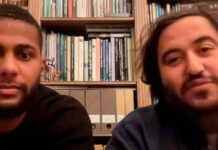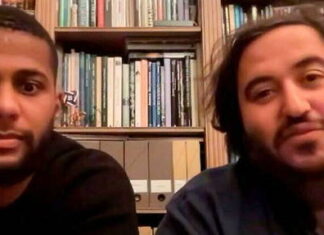On May 29, 2021, after a month of competition, Jonathan Fournel was crowned First Laureate of the Queen Elisabeth of Belgium Competition. At 27, he was the first Frenchman in thirty years to win this prestigious prize, but also the first to win the Prix du Public Musiq’3 and the Prix Canvas-Klara. A year later, when he released his first solo album dedicated to Brahms last October on Alpha Classics, the pianist continues to perform concerts all over the world. He will be present in several festivals this summer (Estivales de musique en Médoc, Flâneries de Reims…), on tour in Brazil in November or at the Philharmonie de Paris in April 2023. As he prepares to give a recital at the Louis Vuitton Foundation Thursday, June 9, the musician spoke with volubility and sensitivity about his relationship to music, his newfound fame, his participation in Pocket Concerts under the leadership of Gisèle Magnan or his disappointed trombone dreams.
Le Point: How did your history with music begin?
Jonathan Fournel: By my parents, since my father was an organist and teacher of music theory and musical analysis in a conservatory in the east of France, in Sarreguemines. He was also titular in a church which was located not very far from our home. We went there every Sunday and I was always a little more interested in the music than in the service itself. I bathed in it since very small, but I had never wanted to become a musician. I wanted to play the trombone. But my father said to me, “The trombone makes noise, it’s unbearable. If you want to start doing something, you will first play the piano, it’s good to start understanding harmony. And that’s how I started playing the piano, at 7 years old, and I never stopped until today.
And you hooked up with the instrument right away?
The love story was not so beautiful at the very beginning, since I was a little grumpy and that, all the same, in my head, I rather wanted to play the trombone, so I worked very little . I was a very bad student during the first months, I found myself in front of the director because I did so much that the teachers pulled their hair out. And my piano teacher went to my dad and said, “Get him to play the trombone because, anyway, in piano, you’ll never get anywhere.” To be able to like that, it really had to come from me. And what my father did was he bought me some CDs – one in particular: the complete Liszt piano music by György Cziffra – and that was the first upheaval in my life. There are things that I loved about this recording, and things that I really wanted to play. But since I wasn’t good enough and too lazy, I couldn’t play them. So I had to work to be able to do them.
And, eventually, you became a pianist… When did that become your dream?
I had a kind of revelation, around 15 or 16, when I found myself at the Paris Conservatory with other people my age who were doing the same thing. There, I had the impression that I could also do much more than I thought with my ten fingers and my brain. That’s when I may have put more attention on the piano rather than just seeing it as a hobby, hoping to become an engineer or a volcanologist. It also came from having discovered a lot of things in music, recordings, new works to work on. There were so many that I really had to become a pianist to have the time to do them.
In your journey, you will meet many teachers, some very prestigious, but there is one with whom you will form a special relationship, it is Gisèle Magnan.
I was maybe 12-13 when I first met her. I was a bit of a fathead when I found myself at her place for the first time, my wish was to work a lot of Liszt, Rachmaninoff, Prokofiev, and Gisèle told me that would wait. First, we will work on the basics, we will do Beethoven, Mozart. It was a bit of a cold shower. But now, I understand why she wanted to put things back in order, she taught me a lot, a lot until today. She opened my eyes to a lot of things. I am really very grateful for everything she has done, and I consider her even more than a teacher, a friend.
It is also through Gisèle Magnan that you will participate in the Concerts de poche.
I knew the very beginning of the Concerts de poche, I feel like I grew up a little with them. At first, I participated in workshops, whether in high schools and colleges or in retirement homes… It also built me in my way of seeing things, it perhaps gave me more answers to the question of why I make music, why I play the piano. The Pocket Concerts helped me in this reflection. And then, I didn’t take part directly in the Concerts de poche concerts, since Gisèle thought that you had to be at the top level every time. But today, I’m very happy to be able to come back to the Concerts de poche, each time to see how much it creates such a positive enthusiasm in the world of music, in France in particular. It’s wonderful to see that.
During your studies, you will participate in many competitions, why did you choose this path?
It was a choice that was a bit forced… It seems like competitions, exams and auditions are still something that you “have to” face. In 2013-2014, I did my first major competitions and, luckily, it went very well. It gave me more notoriety and more concerts. Then, I had a little less desire to start preparing for a competition. I had the impression that it was the world that wanted us to participate in order to find a place for ourselves, but the competitions are humanly difficult. There has to be a first, a second, a third prize, and then after that there are 200 who are eliminated. It’s quite hard psychologically, I didn’t really want that for a long time.
And finally, you decide to take part in a last competition, that of Queen Elisabeth of Belgium, and it is a great success. A year after the competition, what has changed in your life?
Many things. I can choose my projects and my concerts. Before, I didn’t have an agent, so it was a change for the organization. In places that seemed a little inaccessible to me, halls or festivals that were for the great pianists that we see on TV, the doors opened after the competition. Many things that seemed impossible are possible now.
Did it change the way you play?
The contest reassured me a little bit about some questions I was asking myself before, some ideas that I had in my head: whether it was the right direction to take in certain works in relation to the style of play, the way to do it. I also feel like I experienced the greatest stress of my life when I entered the competition. Many things still seem easier afterwards. The stress is still the same as before, but I’ve been through worse, so I’m putting it into perspective a little bit.
We have to reach out to them, show them that classical music is not just for people who know it, for “the elite”.
During the competition, you chose to play several pieces by Brahms, you recorded an album dedicated to him and you are going to perform it again this Thursday at the Vuitton Foundation. Why do you like it so much?
I have loved this composer for a long time. I discovered his symphonies when I was a little younger, I really like orchestral music. I even wanted, for a period, to become a conductor, it’s something that’s always in my head. And I found in his piano music this very orchestral side. With this way of using the piano as if we really had all the instruments of an orchestra under our fingers. Or maybe because I grew up with an organist father. There is a very pleasant side, very generous.
It was kind of an obvious choice for my competition. And for recording, I wanted to do works that I feel good about, and not choose things to please other people who think it would be better for me or for a career. Since I can’t get enough of Brahms, again this year I’m playing his third sonata. And for next year maybe there will be more Brahms. Afterwards, I discovered other composers, but for now I can’t get enough of them.
This Thursday on the program there is also Chopin’s Sonata n° 3 op.58…
These are two pieces that are actually very different, but very close. There are only a few years of difference between these two works, but nevertheless many differences. On one side, a sonata no. 3 by a young 19-20 year old Brahms (1853), who already has so much to say. These are not the beginnings of a Brahms who will become better afterwards. It’s already Brahms himself, he already has his character. He asserts himself as a composer with his own style. And I like to put that in relation to Chopin’s Sonata No. 3 (1844), which is a bit of an “old age” work, the poor thing, he was 34 years old, it’s the period when he rests, where he returns to Nohan on the advice of George Sand, where he resumes writing all the time. And we feel that there is also a great research within this work, in the style as in the way of writing, a great evolution compared to his works of youth where there was this side a little less orchestral.
You have a wonderful dance card for the next few months, with concerts all over the world. What drives you?
To learn tons of new things to do and also to be able to have a good time when I can, whether it’s with my family or with my girlfriend. To also be a little more free from that goal (or that dream) of succeeding in having a Grand Prix at an international competition. Now I just have to focus on new things that I want to learn, recording projects, programs, chamber music and maybe festival projects that I want to create . And it also means entering a little more into active life. It was still time, at 28!
We know that classical music audiences need to renew themselves, does being young and exposed to the media give you some responsibility?
We have to reach out to them, show them that classical music is not just for people who know it, for “the elite”. You have to show them that it’s not something that’s foreign to them, even if they don’t listen to it every day, if they feel like they don’t understand it, that in fact it’s is something easier than they think. And what is this music for: to certainly ask other questions, to tell a story and to get out of your daily life a little bit. In fact, it’s like a painting where there are several characters, or a novel or a play.
Today, do you know why you play the piano?
Above all for me, it really gives me pleasure to be in front of the piano and to enjoy all those notes that can spring from a wooden box with strings. But also to see what music brings to certain people. And that’s what I really like. At the same time, music makes me happy, touches me enormously and brings me to another world, and at the same time it allows me to share my feelings with other people, with as many people as possible. And that’s what drives me with the piano. And to be able to tell stories.
Did you finally get a chance to try the trombone?
Unfortunately no. But I did trumpet for two years when I was in Germany, you had to make a second instrument. I worked in the attic because, otherwise, my parents didn’t really agree, they said it made noise, but the piano made noise too, there’s no denying that.
Recital Thursday, June 9 at the Fondation Louis Vuitton, 25 euros. Upcoming concerts on https://jonathanfournel.com/index.php/index-phpindex-phpshows/.


















